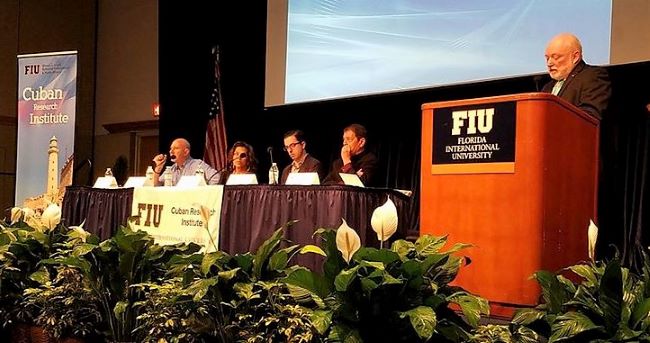- Home
- Events
Events

Viernes de Musicalia | Flamenca Rumba and Guajiras
| Start: | |
|---|---|
| End: | |
| Venue: | Green Library, Room 220 |
Join us for an illustrated lecture by dancer and choreographer Clarita Filgueiras on the historical development of rumba and guajira music in Cuba, as well as their intertwining with flamenco in Spain. Since the 1800s, Spain has embraced these back-and-forth rhythmic journeys, weaving them into the fabric of flamenco's soulful expression through song, instrument, and dance.
Book Presentation | Cuban Fusion: The Transnational Cuban Alternative Music Scene
| Start: | |
|---|---|
| End: | |
| Venue: | Books and Books, 265 Aragon Ave., Coral Gables, FL |
Surveying the impact of Cuba's economic crisis after the demise of the eastern socialist block, Dr. Eva Silot Bravo documents a relatively unexplored transnational network of collaborations among Cuban musicians who migrated to many different countries from the 1990s forward. The book's main argument is that in light of the 1990s crisis in Cuba, new transnational and alternative narratives emerged, resulting in creative "in-between" spaces that reflect a postsocialist aesthetic condition.
Lecture | "El Gagá": An Afro-Dominican Cultural and Religious Manifestation
| Start: | |
|---|---|
| End: | |
| Venue: | FIU Modesto A. Maidique Campus, Green Library (GL), Room 220 |
This lecture by Jonathan de Oleo Ramos will focus on "El Gagá," a religious cult practiced in the Dominican Republic and other Latin American countries. Many interpret "El Gagá" as an expression of folklore and Carnival, but it is more than that. It is a set of rural socio-religious relations linked to sugarcane mills on the island of Santo Domingo. It is also the synthesis of cults such as Voodoo, spiritualism, "Santería," and Catholicism.
Panel Discussion | Art, Censorship, and Resistance in Cuba
| Start: | |
|---|---|
| End: | |
| Venue: | FIU Modesto A. Maidique Campus, Graham Center, Room 150 |
Conflicts between the Cuban government and intellectuals intensified with the passing of Decree 349 in April 2018, a law restricting the freedom of expression of artists and requiring them to obtain permission from the government for performing in both public and private spaces. This panel will gather several threatened Cuban scholars who have received a Mellon fellowship at FIU, to share and discuss their experiences with state repression and persecution on the Island.
Lecture | Ybor City: Crucible of the Latina Sout
| Start: | |
|---|---|
| End: | |
| Venue: | The Wolfsonian-FIU, 1001 Washington Ave., Miami Beach |
Decades before Miami became Havana USA, a wave of leftist, radical, working-class women and men from prerevolutionary Cuba crossed the Florida Straits, made Ybor City the global capital of the Cuban cigar industry, and established the foundation of "latinidad" in the Sunshine State. Historian Sarah McNamara tells the story of immigrant and U.S.-born Latinas/os who organized strikes, marched against fascism, and criticized U.S. foreign policy.
Book Presentation | Puerto Rico: What Everyone Needs to Know (Second Edition)
| Start: | |
|---|---|
| End: | |
| Venue: | Books and Books, 265 Aragon Ave., Coral Gables, FL |
In the second edition of "Puerto Rico: What Everyone Needs to Know®," Dr. Jorge Duany unravels the fascinating and turbulent past and present of an island that is politically and economically tied to the United States, yet culturally distinct. The book provides a succinct, authoritative introduction to the island's rich history, culture, politics, and economy, as well as its diaspora.
Panel Discussion | Afro-Cuban Culture: Contributions to Music, Religion, and Art
| Start: | |
|---|---|
| End: | |
| Venue: | Frost Art Museum, 10975 SW 17th St, Miami, FL 33199 |
The Frost Art Museum will hold an exhibition by Cuban artist Juan Carlos Alom, who has focused on Afro-Cuban culture in his photographic work. This panel discussion will bring together several experts to examine the major role of Afro-descendants in the development of Cuban music, religion, and art.
Annual Conference | Association for the Study of the Cuban Economy
| Start: | |
|---|---|
| End: | |
| Venue: | FIU College of Law |
The theme of the 2024 ASCE conference will be "Cuba in Crisis." While the organizers are specifically looking for papers that assess the current economic situation and suggested reforms, they also welcome Cuba-focused papers dealing with the political or social economy, economic history, lessons from other countries, international commercial relations, demography, labor market issues, and the diaspora.
Book Presentation | Murder at Biltmore Way
| Start: | |
|---|---|
| End: | |
| Venue: | Books and Books, 265 Aragon Ave., Coral Gables, FL |
Join us for a panel discussion to celebrate the upcoming release of the English translation of "Crimen en Biltmore Way" / "Murder at Biltmore Way," by Dr. Uva de Aragón. The panel will bring together the author of the detective novel and the translators, Drs. Jeffrey Barnett and Kathleen Bulger-Barnett, to comment on her work as well as read passages from their translation.
Film Screening and Discussion | Children of the Diaspora
| Start: | |
|---|---|
| End: | |
| Venue: | FIU Modesto A. Maidique Campus, Graham Center, Room 150 |
Directed by Lunes Oña, "Children of the Diaspora" is a documentary that delves into the persistence of Cuban culture in recent generations of the diaspora. Several of the participants have never visited the island or have a vague memory. The documentary explores the experience of living between two cultures, the Cuban home and the host country. The interviewees were born or raised in Miami, New Jersey, Canada, Angola, Venezuela, Colombia, Ecuador, Mexico, and Spain, among others.